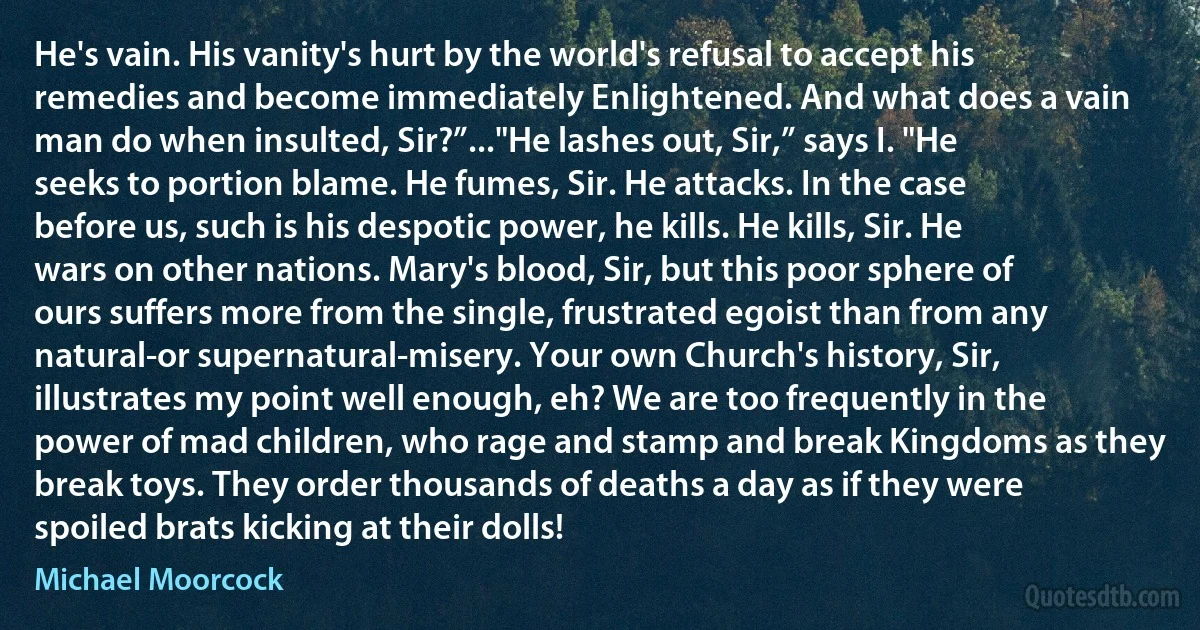
He's vain. His vanity's hurt by the world's refusal to accept his remedies and become immediately Enlightened. And what does a vain man do when insulted, Sir?”..."He lashes out, Sir,” says I. "He seeks to portion blame. He fumes, Sir. He attacks. In the case before us, such is his despotic power, he kills. He kills, Sir. He wars on other nations. Mary's blood, Sir, but this poor sphere of ours suffers more from the single, frustrated egoist than from any natural-or supernatural-misery. Your own Church's history, Sir, illustrates my point well enough, eh? We are too frequently in the power of mad children, who rage and stamp and break Kingdoms as they break toys. They order thousands of deaths a day as if they were spoiled brats kicking at their dolls!
Michael MoorcockRelated topics
blame blood break case children day egoist enough history hurt mad man order point poor power single vain well fumesRelated quotes
There is a word very commonly used these days: "anti-communism." It's a very stupid word, badly put together. It makes it appear as though communism were something original, something basic, something fundamental. Therefore, it is taken as the point of departure, and anti-communism is defined in relation to communism. Here is why I say that this word was poorly selected, that it was put together by people who do not understand etymology: the primary, the eternal concept is humanity. And communism is anti-humanity. Whoever says "anti-communism" is saying, in effect, anti-anti-humanity. A poor construction. So we should say: that which is against communism is for humanity. Not to accept, to reject this inhuman Communist ideology is simply to be a human being. It isn't being a member of a party.

Aleksandr Solzhenitsyn
Could it be possible, Hezekiah asked himself, that there was no room for both the faith and truth, that they were mutually exclusive qualities that could not coexist? He shuddered as he thought of it, for if this should be the case, they had spent their centuries of devotion to but little purpose, pursuing a will-o'-the-wisp. Must faith be exactly that, the willingness and ability to believe in the face of a lack of evidence? If one could find the evidence, would then the faith be dead? If that were the situation, then which one did they want? Had it been, he wondered, that men had tried what they even now were trying and had realized that there was no such thing as truth, but only faith, and being unable to accept the faith without its evidence, had dropped the faith as well?

Clifford D. Simak
If we could dredge up something forgotten not only by ourselves but by our whole generation or our entire civilization, we should become indeed the boonbringer, the culture hero of the day-a personage of not only local but world historical moment. In a word: the first work of the hero is to retreat from the world scene of secondary effects to those causal zones of the psyche where the difficulties really reside, and there to clarify the difficulties, eradicate them in his own case (i. e., give battle to the nursery demons of his local culture) and break through to the undistorted, direct experience and assimilation of what C. G. Jung called "the archetypal images." This is the process known to Hindu and Buddhist philosophy as viveka, "discrimination."

Joseph Campbell
Wasn't all their effort worthless? Wouldn't it be better to accept the impossibility of their mission? He began to think Krane was mad. If there were a threat, then inevitably they would die. Death was the future of all people, all planets, all universes. Their struggle was symbolic of the futility of living creatures who fought against their own inevitable extinction. What were a few more years of existence compared to the longevity of a cosmos? In those terms, the whole history of their species lasted for less than a fraction of a second. And then, sheltering beside him under the protection of the energy equalizer, she looked up for a second, and, obscurely, he understood that the effort always would be worth it. Always had been worth it.

Michael Moorcock
Our country has been populated by pioneers, and therefore it has in it more energy, more enterprise, more expansive power than any other in the wide world. [...] They have shown the qualities of daring, endurance, and far-sightedness, of eager desire for victory and stubborn refusal to accept defeat, which go to make up the essential manliness of the American character. Above all, they have recognized in practical form the fundamental law of success in American life-the law of worthy work, the law of high, resolute endeavor. We have but little room among our people for the timid, the irresolute, and the idle; and it is no less true that there is scant room in the world at large for the nation with mighty thews that dares not to be great.

Theodore Roosevelt
